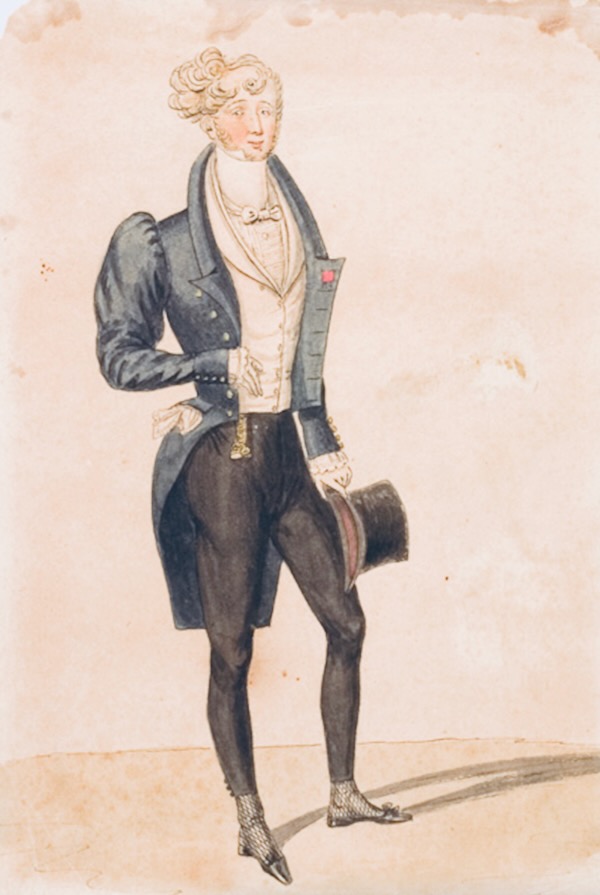
Habits — good, bad and in between — start early. The other day, as I sat in my easy chair reading Christopher Hibbert’s new biography “Disraeli, the Victorian Dandy who Became Prime Minister,” I pondered the nascence of my own flirtation with, and ultimate surrender to, the doctrine of dandyism. As a boy I was always dressing up. One minute I might be a cowboy, cap-guns a-blazing, another I might be a knight, a magician, a prince, a soldier, or the captain of a spaceship.
But at what point in my young life, I wondered, did a flair for costume become a passion for living and dressing well at any cost? More to the point, what nefarious influences worked upon my already flamboyant character (long since brought in check) to cause me to explore and eventually embrace a philosophy so self-centered, self-reflexive and possibly so self-immolating as dandyism? Whence did this curiously addictive tangent spring?
I blame the corrupting influence of children’s literature.
It was in my middle-school library that I came across a book entitled “The Glass Harmonica: A Lexicon of the Fantastical.” This one-volume encyclopedia of fantasy, beautifully illustrated by its author Barbara Ninde Byfield, illuminates castles, knights, quests, vampires, ogres, elves, wizards, and anything apposite to a child of indefatigable imagination. But it was only after I had “liberated” the book some years that I began to notice the lesser entries: piquant, domestic little gems hidden in between the more sensational ones.
One day I was consulting the book on some mythical subject or other — basilisks, I think — when I came across an illustration I had not noticed before. It was of an old man, standing in a doorway glancing at the reader through a lorgnette over a just-arrived letter. He wore a dressing gown (I would have called it a bathrobe back then), slippers, and trousers with straps beneath the instep. The title of the entry read “BEAUX,” and the first line of the definition was “Gentlemen of wit and style, or at of least wits and fashion.” The entry described a character wholly unfamiliar to me: The gentleman of leisure, a quietly heroic character who instead of slaying dragons, rescuing damsels, fulfilling quests, and fighting piracy, rose late, made social calls, went to his tailor (and into debt), “looked-in” at the opera, and only went to bed in the wee hours.
I didn’t understand it all at the time, but the idea was curiously, even wickedly, attractive. These beaux, whoever they were, went against everything I was taught to value. Talk about the “curious attractiveness of others.” I read the entry again and again. Over time, Byfield’s beaux gradually evolved into something like a role model, their languorous existence a dream of elegant, gently iniquitous living.
I kept the book for nearly a decade before guilt caught up with me (it happens to even the most inexorably errant of us), and I returned it to its home for other would-be beaux to be corrupted by. Years later, when I had moved out on my own and began to read history, philosophy and society magazines — that is, to read dandyism — I realized that the beaux of “The Glass Harmonica” were based on real people, and there were even a few still around. Eventually I came to know what the author was really talking about. And rather than being sensibly put-off by the knowledge, I became more hooked than ever. Hibbert’s “Disraeli” brought Byfield’s beaux to mind again, and I found a copy online and bought it. When it arrived, it was all I remembered and more. It’s all there, on a single page, a veritable Moers in miniature for boys:
BEAUX: Gentlemen of wit and style, or at of least wits and fashion. Beaux are invited everywhere and go everywhere, caring a great deal about it all but showing enthusiasm only for racing, gaming and tailoring…
Byfield’s beaux include the dandies and their predecessors, those rapier-carrying, periwiged fellows of earlier days:
They set the fashion in wigmakers, barbers, winemerchants, bootmakers, clubs and coffeehouses, weighing machines, grooms, gaming tables and bookmakers. Above all, they are the fashion with each other.
The Scarlet Pimpernel and his clandestine ilk bear brief mention:
Their studied languor often hides a tenacious purpose and a wrist of steel.
But only the inconsequential is ever taken seriously:
If they are Bucks, Blades, Bloods, Dandies, or Rakehells, their pursuits are audacious and the results much talked of; they often live by gambling, betting heavily on the matches, contests, and races between themselves and their friends. They drive spirited horseflesh and precarious vehicles up and then down staircases of important buildings and engage in duels.
Clothes make the man, and a tailor makes the clothes, but it’s the man who makes the tailor:
Beaux often begin their careers by finding a tailor of talent, or better still of genius, as yet undiscovered by other Beaux. He will recognize the broad shoulders, slim waist, and shapely calves of the candidate the ideal vehicle to display his art. In a very short time and for very little money he will turn the aspirant out in peerless and enviable creations never before seen but soon imitated… inventive doubling, facings, and pipings call attention to unthought-of cravats. The weskits gracefully acknowledge that a Beau’s reputation can rise and fall on the placement of a fob.
And, finally, the pertinacious romance of being majestic through in ruin:
If Beaux do not perish on the dueling ground, hunting field, or in gaming rooms, they tend to dwindle away, deeply in debt, in an unfashionable watering place shuffling about on a stained dressing gown. Reduced to drinking gin, they wait for a summons from an August Personage they have somehow offended. This summons, if it comes at all, will arrive too late.
Dangerous stuff, this. But “BEAUX” is not the only entry perilous to the developing mind. Other entries serve supporting roles to this introduction of elegant corruption to impressionable youth. The entry for “BODYSERVANT” instilled not only the desire for luxury, but also its expectation. “GARRET” made me want to suffer the penurious life of a poet and perhaps, if very lucky, die of consumption or drunkenness. (I got over the first wish in fairly short order, knit half-gloves and greasy hair not being my style at all, though there is still opportunity for the second.) Lastly, the entry for “Gore, and Hazards of the Course” gave me a perverse yen to come down with gout: “Wealth can provide relief for the patient by way of a gout stool of unsurpassed comfort, visits to spas, tenants to evict, mortgages to foreclose, and attendants to curse.”
What kind of sick mind wouldn’t want attendants to curse? Books like Byfield’s are mad, bad and dangerous for young minds to know, and surely ought to be banned. — MICHAEL MATTIS
Image: illustration from Disraeli’s novel “The Young Duke”
